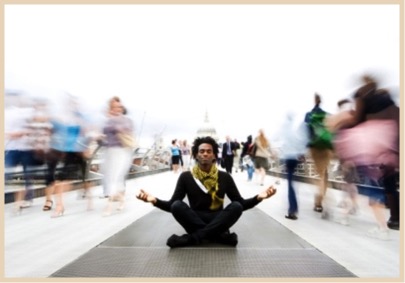
WALKING THE SACRED SPIRAL
How To Find Peace in the Midst of Disorder
Do You Get Crabby and Impatient When Things Go Wrong?
I was just about to drive to Santa Cruz for my time with the Center for Spiritual Living there, where I was serving as Interim Minister. It's usually about a three-hour drive from where I live in Santa Rosa. My check engine light was on, so I took the car to a nearby garage where they could tell me what computer code was coming up. Misfiring and an emissions code. Several hours later, with new spark plugs and a new gas cap, I was ready to pay and get on the road. Then a strange thing happened.
The credit card machine at the garage kept declining my credit card. Apparently, it had been doing this with customers all day. I got on the phone to my credit card company to see if they had a record of the transaction. Yep. In fact, they had approved it twice. The odd thing was that the garage had immediately voided the transaction and refunded the charge both times, too–automatically. Another 40 minutes went by as we tried to figure out how to handle correct the problem. I ended up writing a check.
It was a hot day. I had a bad cold. I was losing energy and patience and wanted to get going. At some point, a kind of grace got my attention and said, “Relax. You'll be there when you get there. You can't make this happen any faster, and getting impatient and crabby won't make this situation better.”


How to Regroup
Recently, I read a quote from–I think it was Byron Katie–who made the point that when we feel dissatisfied or unhappy, it's always because we're comparing this present moment with previous ones, when we think things were better or we were more successful. Or we may be comparing them with our perceptions of other people's present moment and thinking that we should be that well off in life by now, too. We might be wishing and hoping for something different in the future, or clinging to a plan of how things were “supposed to” go.
Peace is available in the present moment if we can observe it and experience it exactly as it is, letting it stand alone without overlaying it with comparisons. This makes perfect sense to me. And I find it really tough to do. How about you?
When we're sick, we want to be well again. When we've lost money, we want to quickly regain our former wealth. When we've fallen out of favor, we want our previous popularity to return. If we've had power in the past, it can be difficult to be gracious when it passes to others.
As weighing, measuring, meaning-making creatures, some of what we experience as beauty, inspiration and wonder is also connected to our capacity for memory and comparison. So, these capacities aren't without positive benefits.
I was at a meeting not long ago, when I was acutely aware of how attached some of the participants were to a certain way of doing something. Then I realized that my impatience and frustration with them was an ironic mirror of how attached I was to having them agree and be content with how it was being done.
Negotiation isn't obstruction. Questions aren't fault-finding. Suggesting alternatives isn't resisting. When I can truly listen to these and respond to them one by one, just as they arise, without accumulating resistance inside myself, I can respond more creatively and effectively. I might learn something. We might jointly come up with better ways of handling something.
How available are we to alternatives? How willing are we to own our attachments and opinions, and hold them lightly? How much happier might we be, if the present moment's gifts weren't being overlooked as we're living in the past?